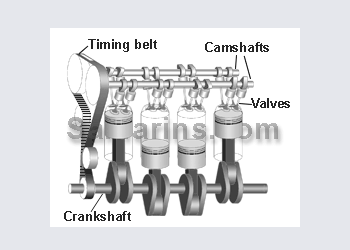Automotive illustrated glossary
 Typical 4-cylinder DOHC twin-cam engine | Timing belt is a toothed belt that connects the engine crankshaft to the camshaft or camshafts as you can see in the picture. The timing belt needed to synchronize the camshaft to the crankshaft position, so the valves will open and close at the proper time in the relation to the position of the pistons. The camshaft rotates at exactly 1/2 speed of the crankshaft; meaning two revolutions of the crankshaft are equal to one revolution of the camshaft. Not all cars have a timing belt. Some of them use a chain or gears instead. |
 Mostly, you can find the timing belt in small and medium size domestic and import passenger cars. For example, 1993 - 1997 Toyota Corolla, 1998 - 2001 Honda Accord, 1997 - 2001 Honda CR-V, 2001 - 2004 Volkswagen Passat - they all have a timing belt.
Mostly, you can find the timing belt in small and medium size domestic and import passenger cars. For example, 1993 - 1997 Toyota Corolla, 1998 - 2001 Honda Accord, 1997 - 2001 Honda CR-V, 2001 - 2004 Volkswagen Passat - they all have a timing belt.The timing belt must be replaced at a specified by the manufacturer interval. This interval may vary from 60,000 miles to 105,000 miles (from 96,000 km to 168,000 km).
 In addition, the timing belt must be replaced if it has any damage like cracks (see the picture below), cuts or excessive wear. If not replaced in time, it may break possibly causing serious engine damage. When a timing belt breaks, the camshaft stops turning leaving some of the valves in the open position. The crankshaft, because it's heavier, continues to rotate by inertia. In an interference engine, this will cause the pistons to strike the valves that left open. This may result in broken or bent valves, damaged pistons, and possibly, destroyed cylinder head.
In addition, the timing belt must be replaced if it has any damage like cracks (see the picture below), cuts or excessive wear. If not replaced in time, it may break possibly causing serious engine damage. When a timing belt breaks, the camshaft stops turning leaving some of the valves in the open position. The crankshaft, because it's heavier, continues to rotate by inertia. In an interference engine, this will cause the pistons to strike the valves that left open. This may result in broken or bent valves, damaged pistons, and possibly, destroyed cylinder head.The damage will be less extensive in a non-interference engine but in either case, the engine will stall, leaving you stranded.
If you're looking for detailed information on your car, such as timing belt replacement procedure, how to set the timing, timing marks, timing diagram, etc., you can buy an online subscription from Alldata DIY and get an instant access to the repair manual for your car.
[Source: samarins.com]
















No comments:
Post a Comment